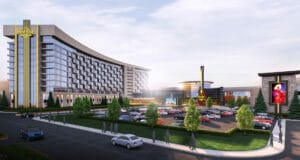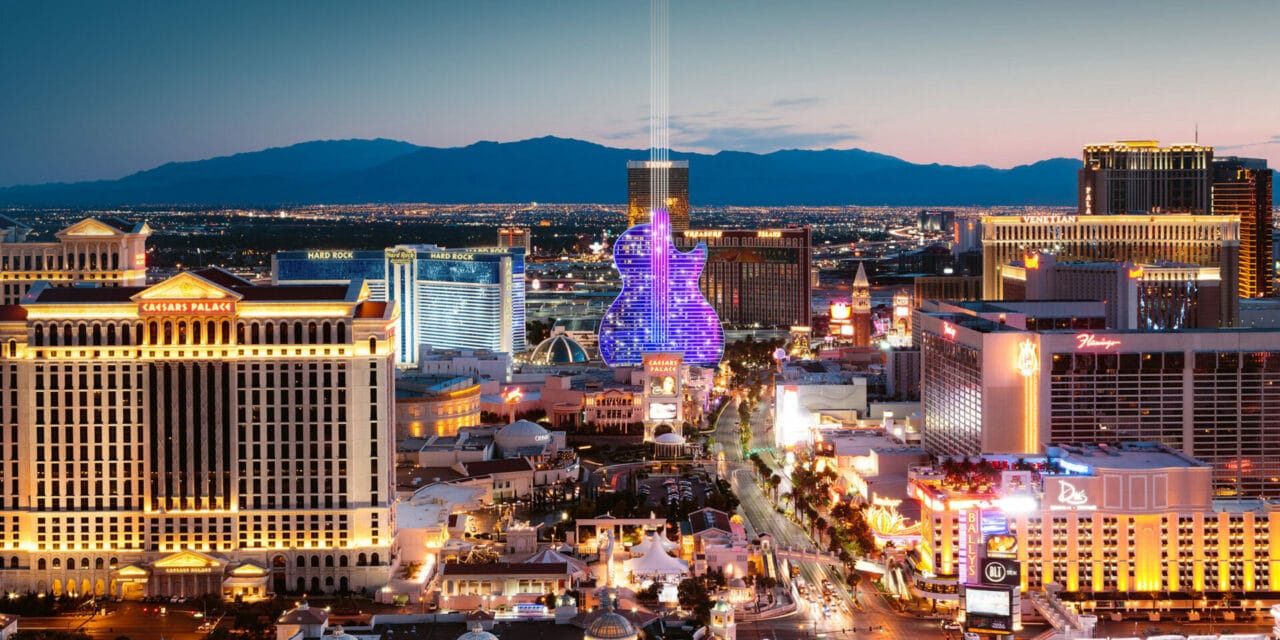BACK ON THE STRIP: A rendering of the Hard Rock Hotel and Casino planned for the Las Vegas Strip, which will convert the Mirage Hotel and Casino. (Courtesy Hard Rock International)
Global expansion has accelerated since Seminole Tribe of Florida took ownership
It’s no exaggeration to say that Hard Rock International has Disney-esque aspirations, not just when it comes to customer service, but also its place in the live entertainment universe.
The chain of hotels, casinos and music-themed eateries was bought from the Rank Group for nearly $1 billion in 2006 by the Seminole Tribe of Florida and the Hard Rock empire continues to grow in leaps and bounds.
A number of major projects have opened in recent years and even more ambitious plans lie ahead.
See Also:
50 Years Of Hard Rock (Cover Stoy)
Hard Rock Star: CEO Jim Allen Q&A
“Our pipeline of projects is tremendous,” said Joe Emanuele, Hard Rock International’s senior vice president of design and construction. “We just recently opened Hard Rock Hotel Madrid (in Spain) and Hard Rock Hotel New York. We just opened up Budapest (Hungary).” Hard Rock International works largely with architecture firm Klai Juba Wald and structural engineers DeSimone.
Moving forward, the company will open a temporary hotel in Bristol, Virginia, in July and in two years will add a permanent hotel/casino in that city. A temporary Hard Rock Casino opened in Rockford, Illinois, in November, again with plans to open a permanent hotel-casino there in two years, Emanuele explained.
It’s been a year since the company opened Hard Rock Casino Northern Indiana in Gary, he said, adding, “It’s now the No. 1 casino in that state,” Emanuele said.
“We also this year converted our casino in Cincinnati,” he said. “We rebranded that into a Hard Rock Casino. We’re going to expand that with a hotel.”
Future openings include Hard Rock Hotel and Casino Tejon in Bakersfield, California.

BAKERSFIELD Of DREAMS: A rendering of the proposed $600 million Hard Rock development in Tejon, California, near Bakersfield. Other projects in smaller markets include in Bristol, Virginia, and Gary, Indiana. (Courtesy HRI)
“We’re planning a new integrated resort in Barcelona (Spain) and the same thing in Athens (Greece) and Mexico City,” Emanuele said.
“And last but not least we have this little project on the Las Vegas strip, which is converting the Mirage into a Hard Rock Hotel/Casino.”
The company reportedly paid more than $1 billion to buy the operations of the iconic, Steve Wynn-developed property from Vici Properties, which owns the parcel on which the Mirage sits.
The Mirage is to be completely renovated and the property rebranded with the addition of a guitar-shaped tower, like the company’s flagship Seminole Hard Rock Hotel and Casino in Hollywood, Florida.
“It will change the face of the Strip,” Emanuele said of the Vegas development. “What we’re going to do there is so imaginative, so creative. It’s a beautiful design, a guitar-shaped tower like you’ve never seen before.”
The original Hard Rock Casino near the Strip in Las Vegas, which opened in 1995, closed in 2020, after being sold and was rebranded last year as Virgin Hotels Las Vegas.
Emanuele acknowledged the aggressive growth trajectory of the company following the brand’s purchase by the Seminole Tribe of Florida.
“All they’ve done is given us the tools and the financial wherewithal to take the brand wherever it’s going to be,” he said. “I believe that in time we will become the No. 1 hospitality/entertainment company in the world. And in certain aspects, in our 50th anniversary year, we are just about there.”
Indeed, the company’s Tampa, Florida, casino-hotel, with 750 rooms, is the most profitable casino in the U.S. and among the most profitable in the world. Both the Tampa and Hollywood locations underwent major expansions in 2019.

FLAGSHIP STATUS: The Seminole Hard Rock Hotel and Casino’s guitar-shaped hotel tower in Hollywood, Florida, was completed in 2019. (Joe Raedle/Getty Images)
Not bad for a tribe that entered the gambling business with bingo halls in 1979.
“With us being in multiple countries and an international brand, it’s good to partner. In New York, our hotel that just opened (on 48th Street in midtown Manhattan’s Music Row near Times Square and Rockefeller Plaza), that is a five-year plus timeline that came to fruition.”
Working with a developer in New York, HRI searched for a location for an international hotel before coming up with the midtown site.
“It really has now taken our upper brand scale of hotels to four-stars-plus, up to the next level, from the look and feel, from the functionality, from the branding, the implementation of memorabilia that is very much integrated,” Emanuele said, gushing. “The way we brand and create ‘Hard Rock moments’ is a lot through our memorabilia.”
Memorabilia has grown in importance and prominence at the various properties, he said.
“Years ago you used to plunk it on the wall like Applebees, now it’s fully integrated into the design,” he said. “When we work with designers, we say, ‘We’re a four-star-plus brand and we’ll help you layer the brand on top of it.”
Some have tried to duplicate the Hard Rock aesthetic, Emanuele said, “But no one can create that music vibe, that experience better than Hard Rock. That’s what makes us different. The vibe is music. You can have the worst day of your life, so to speak, and then you get into your car or you get into a setting where you hear music and a song comes on that puts you back into the perspective of a memory, of a loved one, or when you were younger or whatever, it changes your whole perspective of the day. That’s the vibe that we are trying to create.”
Is there a limit to the company’s growth?
“The brand actually works in just about every jurisdiction,” Emanuele said. “Because it’s music and it’s international, it works in any language or environment or culture, so there is no end to this potential. However, we like to manage our way into portal cities. That’s where you get the biggest impressions, but we also have hotels in some of the smaller (markets), which reimports the brand because those people aspire to go to other areas and if you reinforce that all over and maintain the level of experience, then you will be able to manage and make those Hard Rock hotels or venues wherever you like that’s manageable and has the right amenities to it.”
He said whether the company opts to build from scratch or repurpose an existing property in the Hard Rock image has a lot to do with prevailing economic conditions.
The pandemic put a crimp on some expansion aspirations, but with the worst of the contagion seemingly in the rear view, there are “opportunities for renovations and conversions,” Emanuele said.
“When you’re doing conversions, then obviously you have to workshop them a little bit more, but some of the older venues have some different cultural aspects in different areas,” he said. “We actually like to take perhaps an old hotel, layer it with our brand, but never lose its roots and it tells those amazing stories of maybe when it was built or people that visited at a certain time, whether they were artists or not. So, the blending, the layering of our brand onto older features is unique. It’s all about telling the stories and telling them correctly. And if you are able to have the right budget to do a conversion, you can make that pretty special, as well as a new build.”
The growth of and legitimization of gaming has played in the brand’s favor from a development standpoint, Emanuele said.
“Gaming is a good foothold in terms of revenue, but we’re not just a gaming company,” he said. “We are a full entertainment company and it’s again about the DNA and the music. It’s not just about gaming. We want people to have a good F&B experience, a good music experience and if you have the appetite and you want to gamble, you are able to do that as well.
Just as with its memorabilia, there is a drive to make everything an authentic experience.
“We would not put anything out that wasn’t real, that didn’t have a true story,” Emanuele said.
Asked if the current state of geopolitics is a cause of concern regarding where and how the company invests, Emanuele said the answer is an obvious yes.
“We have a lot of European venues and the world is affected by things and sometimes we are,” he said. “We’re cautious. We were looking at a potential development some time ago in Ukraine. That’s not the case right now. During the pandemic, all these different jurisdictions had different regulations. Some of our cafes closed. They are all open now, fortunately, but we had to be very flexible and creative in our different venues, especially the cafes. New York was a different experience than Florida.”







